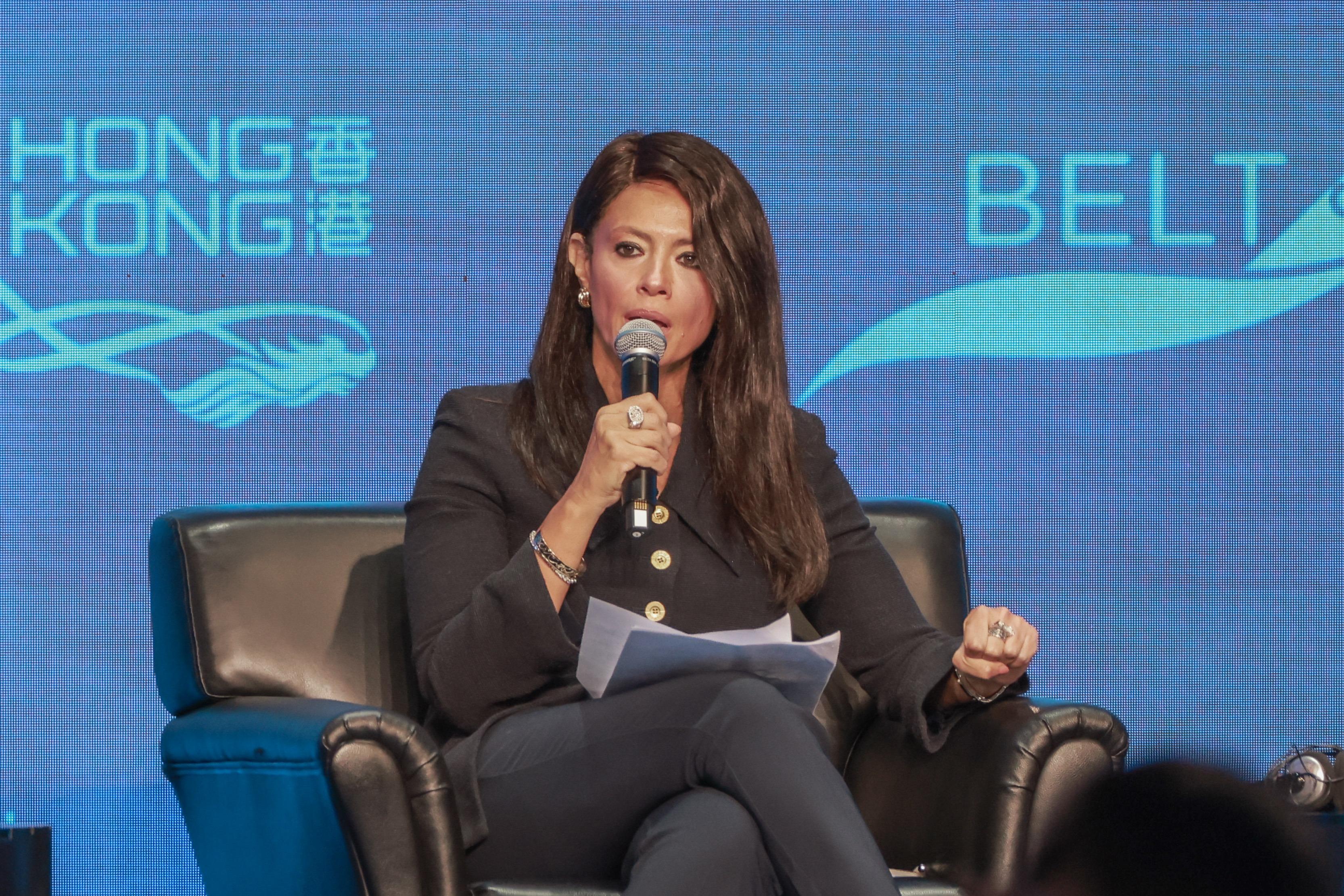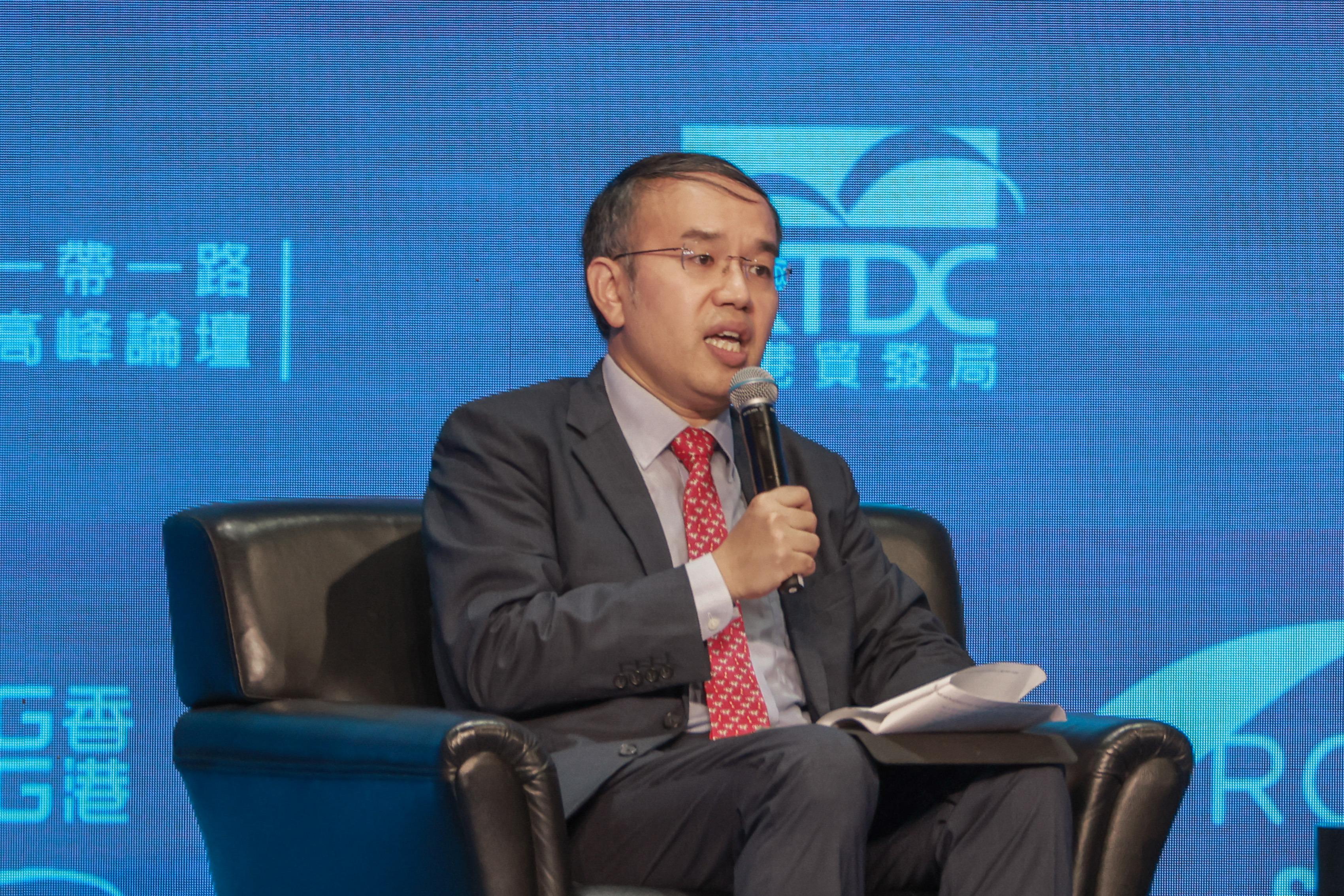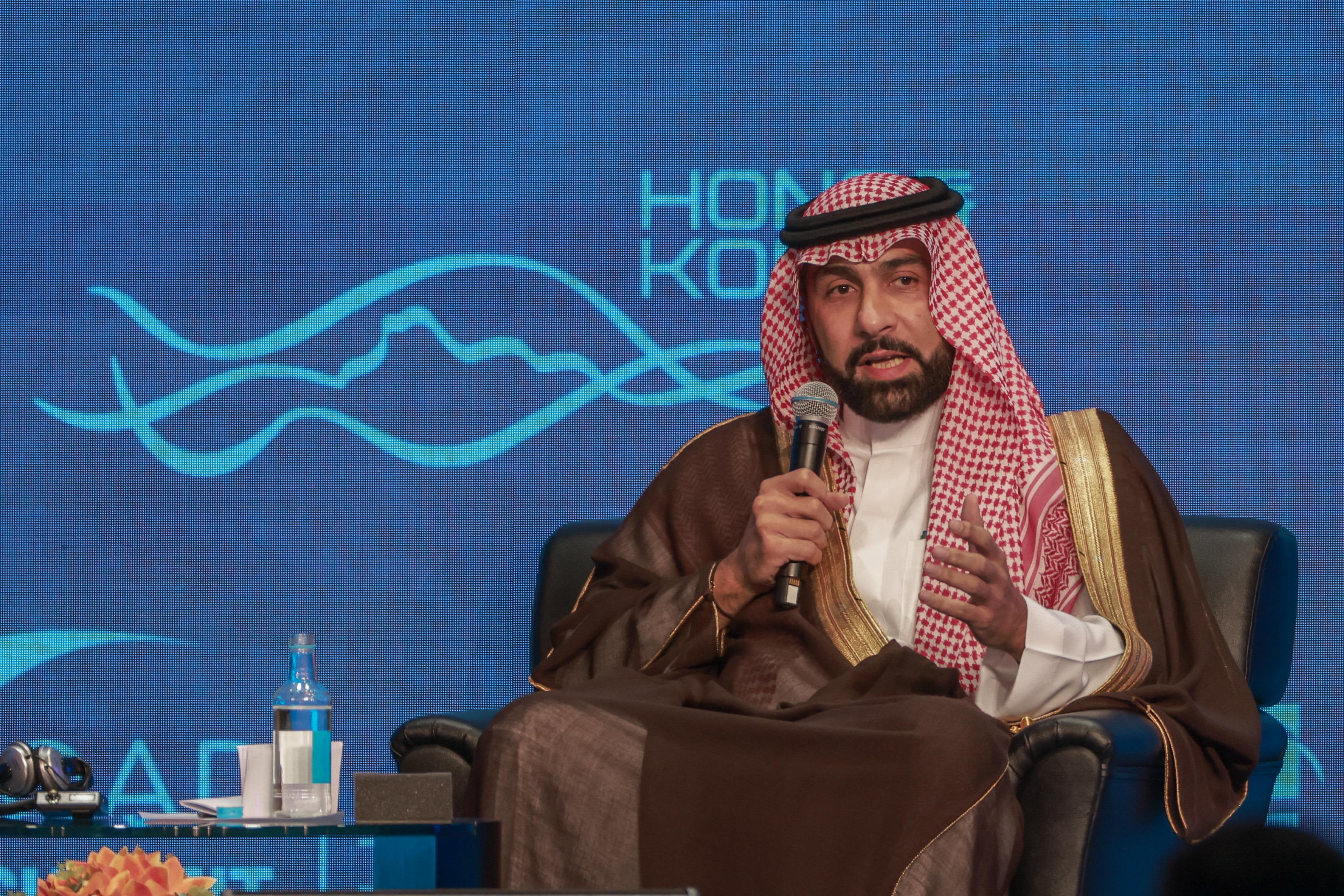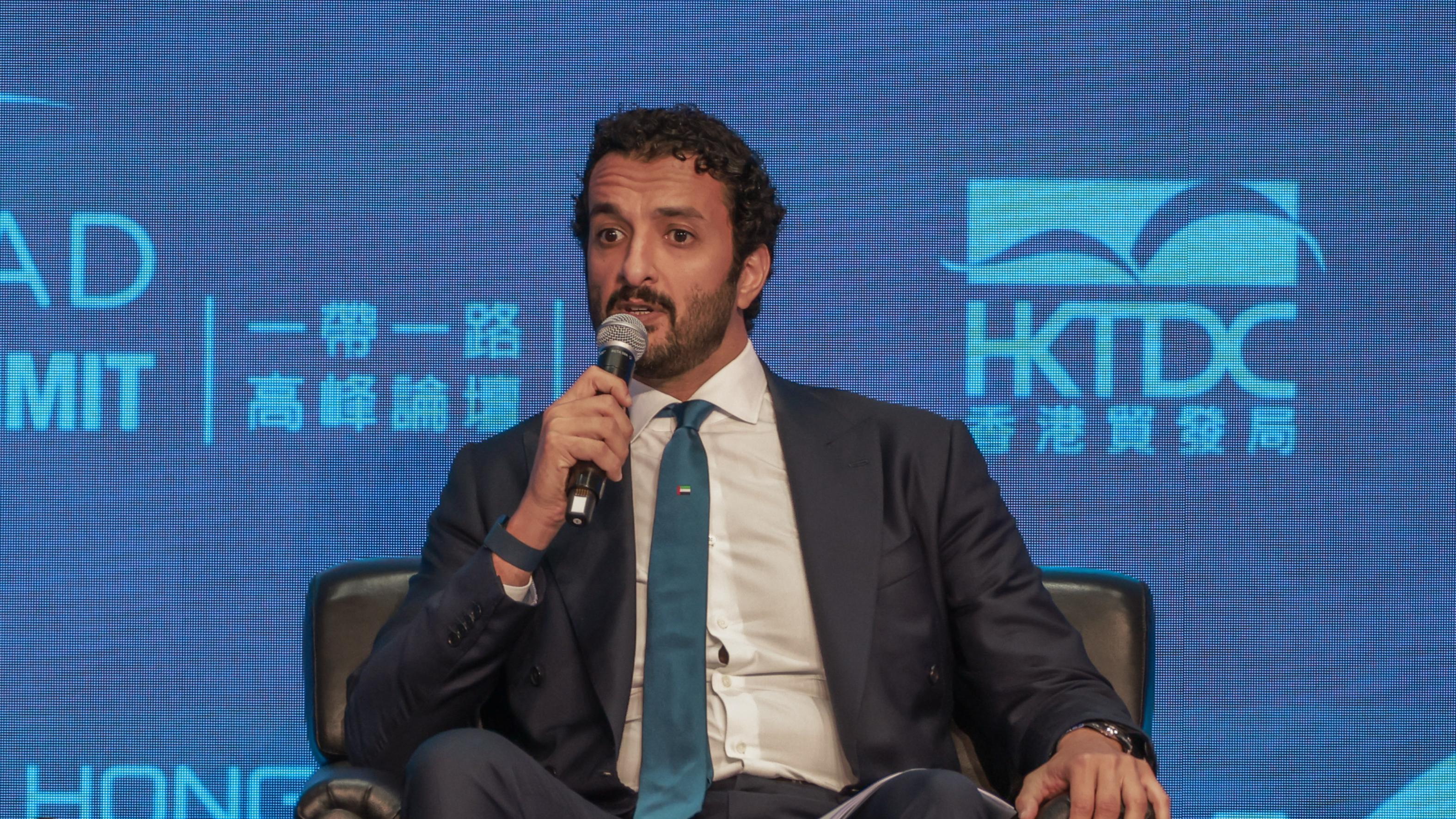Local leaders unveil region’s potential in frontier sectors, call for cooperation
 Egypt's Minister of International Cooperation Rania A. Al-Mashat speaks during "Policy Dialogue I: Tapping into the Potential of the Middle East" at the Belt and Road Summit 2023 at Hong Kong Convention and Exhibition Centre in Wan Chai on Sept 13, 2023. (ANDY CHONG / CHINA DAILY)
Egypt's Minister of International Cooperation Rania A. Al-Mashat speaks during "Policy Dialogue I: Tapping into the Potential of the Middle East" at the Belt and Road Summit 2023 at Hong Kong Convention and Exhibition Centre in Wan Chai on Sept 13, 2023. (ANDY CHONG / CHINA DAILY)
Companies being wooed to do business in the Middle East and North Africa region were introduced to a range of sectors they could invest in — with sustainability emerging as a common focus — at a dedicated forum on Wednesday.
Visiting high officials from the Kingdom of Saudi Arabia, the United Arab Emirates and the Arab Republic of Egypt were part of a panel discussion titled “Tapping into the Potential of the Middle East”, at which opportunities in the logistics, infrastructure, sustainability, green financial instruments, maritime, life and sciences sectors, to name but a few, were deliberated.
The session was part of the eighth Belt and Road Summit, featuring dedicated forums on the Middle East for the first time as relations between the region and China have increasingly grown closer in recent years.
Egyptian Minister of International Cooperation Rania A. Al-Mashat said climate action, green transformation, and green financial instruments “have become extremely important”. The Suez Canal Economic Zone, she said, is a very important development within this area. In June, the Suez Canal authority approved a series of projects with international partners involving manufacturing, green hydrogen, and water desalination.
 Secretary for Financial Services and the Treasury Christopher Hui Ching-yu delivers a speech during "Policy Dialogue I: Tapping into the Potential of the Middle East" at the Belt and Road Summit 2023 at Hong Kong Convention and Exhibition Centre in Wan Chai on Sept 13, 2023. (ANDY CHONG / CHINA DAILY)
Secretary for Financial Services and the Treasury Christopher Hui Ching-yu delivers a speech during "Policy Dialogue I: Tapping into the Potential of the Middle East" at the Belt and Road Summit 2023 at Hong Kong Convention and Exhibition Centre in Wan Chai on Sept 13, 2023. (ANDY CHONG / CHINA DAILY)
Panel Chair and Hong Kong Secretary for Financial Services and the Treasury Christopher Hui Ching-yu noted that the Middle East “since ancient times” has not only been a key connector, but “also a significant contributor to cultural and commercial exchanges”. And in more modern times, he said, the region “has also taken up the role of critical exporters of natural resources and major players in innovation and technology”.
“There are at least two very exciting developments in the Middle East. First, the region is becoming a hub of international collaboration. The Middle East, which spans across the African, Asian, European continents, is situated in a strategic location for the Belt and Road Initiative, for the flow of capital, goods and talents. Hong Kong shares similar characteristics,” Hui told the panel.
United Arab Emirates’ Minister of Economy Abdulla bin Touq Al Marri affirmed the growth taking place in the Middle East, citing the 7 percent economic growth rate of the Gulf Cooperation Council countries — the UAE, Saudi Arabia, Oman, Qatar, Kuwait, and Bahrain.
The UAE was one of the fastest-recovering economies in the world, he said, and its leadership is looking to double the size of the economy in the next seven years.
“Where can we do 7 percent? Is it a traditional economy (like) oil and gas? There are new economies. (We’re looking) at green economy, financial, economy. When we say that, I think (there’s an) opportunity for us to really understand aspects of these potentials,” said Al Marri.
 Saudi Arabia's Advisor in the General Secretariat of the Councll of Ministers H.E. Fahd bin Abdulmohsan Al-Rasheed speaks during "Policy Dialogue I: Tapping into the Potential of the Middle East" at the Belt and Road Summit 2023 at Hong Kong Convention and Exhibition Centre in Wan Chai on Sept 13, 2023. (ANDY CHONG / CHINA DAILY)
Saudi Arabia's Advisor in the General Secretariat of the Councll of Ministers H.E. Fahd bin Abdulmohsan Al-Rasheed speaks during "Policy Dialogue I: Tapping into the Potential of the Middle East" at the Belt and Road Summit 2023 at Hong Kong Convention and Exhibition Centre in Wan Chai on Sept 13, 2023. (ANDY CHONG / CHINA DAILY)
Further, he said the UAE “has looked at these new economies” and understands which talents are needed, including the movements of talented professionals.
“The UAE has always been a seaport, (then we) moved on to an airport. We’re going to expect to move around 130 million passengers toward end of this year,” he added.
Looking at the current state of the economy, Al Marri said it was “a time of a lot of deglobalization, refragmentation, and recalibration”, and “not just the aspect of goods but services as well”. The BRI provides the opportunity to “reengineer and recalibrate” and underline immediate challenges, and to explore ways to unlock potential opportunities, the minister said.
Fahd bin Abdulmohsen Al-Rasheed, adviser in the General Secretariat of the Council of Ministers of Saudi Arabia, said Hong Kong “has been an inspiration both in building ports and airports”.
“We are over here together to celebrate a decade of the BRI. And it is a historic moment,” said Al-Rasheed, who is visiting Hong Kong for the first time.
He said the world is facing a $14 trillion deficit in infrastructure, and there are “a lot of questions, but very few answers”, and that the BRI “has been an answer to that challenge” as the China-led initiative has brought 150 countries on board, mobilizing $1 trillion, lifting 40 million people out of poverty and generating 140,000 jobs.
“As we move forward, the Middle East will play a big role,” said Al-Rasheed, citing its involvement in the energy sector, as well as the importance of the Red Sea, which carries 13 percent of world trade.
“Saudi Arabia is at the center of that. China is a very important aspect of it. President Xi Jinping’s visit is a key element in that,” he added.
 Minister of Economy of the United Arab Emirates Abdulla bin Touq Al Marri speaks during "Policy Dialogue I: Tapping into the Potential of the Middle East" at the Belt and Road Summit 2023 at Hong Kong Convention and Exhibition Centre in Wan Chai on Sept 13, 2023. (ANDY CHONG / CHINA DAILY)
Minister of Economy of the United Arab Emirates Abdulla bin Touq Al Marri speaks during "Policy Dialogue I: Tapping into the Potential of the Middle East" at the Belt and Road Summit 2023 at Hong Kong Convention and Exhibition Centre in Wan Chai on Sept 13, 2023. (ANDY CHONG / CHINA DAILY)
Also emphasizing the strength of the relationship between Egypt and China, Al-Mashat described the Global Development Initiative as a “very important initiative” which China is pushing forward to advance cooperation on the BRI.
“One important aspect in all of this is, governments by themselves cannot push reforms. Governments by themselves cannot push SDG achievements, and governments by themselves cannot push the connectivity and the objectives of the Belt and Road. Here comes the importance of trying to facilitate private sector engagement in different ways,” said Al-Mashat.
She said another important aspect of the BRI is international cooperation.
“It is only through finding (a) common denominator between policies, objectives that we are able to push forward this cooperation that, as I mentioned, can strengthen the potential when it comes to shared prosperity,” said Al-Mashat from Egypt.
“We are investing in future industries like tech, life science, biosciences. Not just an ambition but a responsibility for us. We cannot, as we invest, forget the environment. It’s important we take responsibility. We invite you to invest and we look forward to investing with you,” said Al-Rasheed, from Saudi Arabia.


